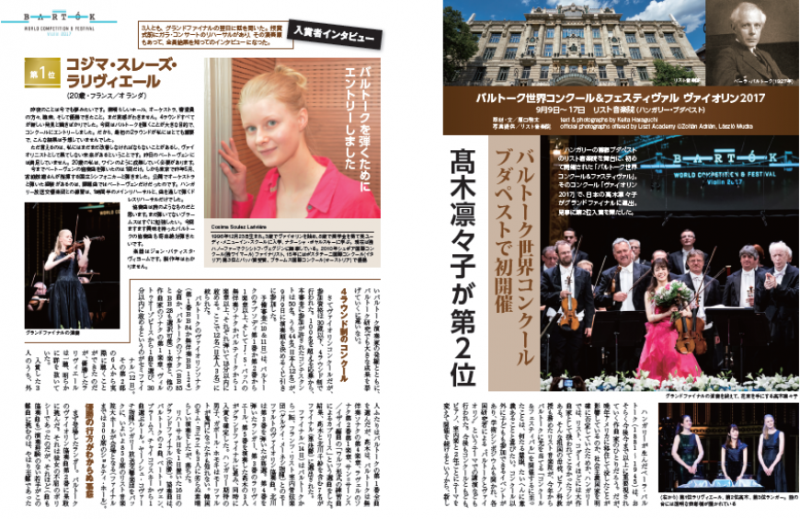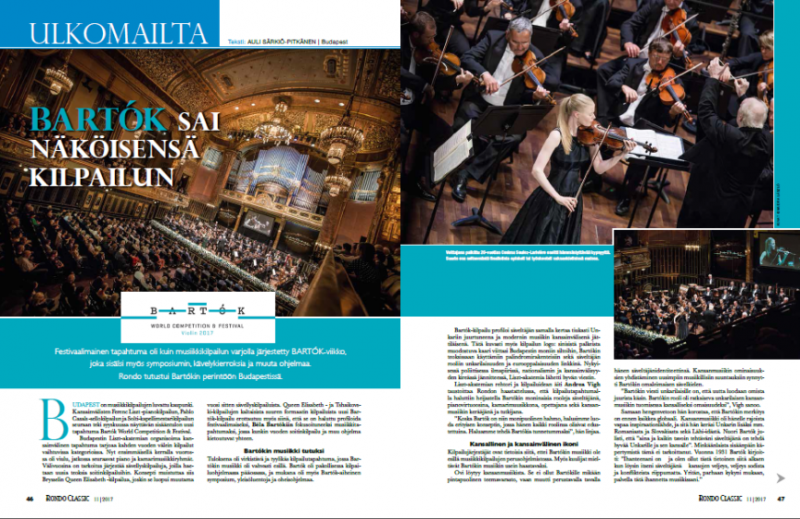„BARTÓK ALWAYS TOUCHES ME, AND I MUST ANSWER TO HIS CALL”
The Bartók World Competition and Festival from th Finnish and Japanese perspectives.
The Bartók World Competition and Festival was virtually ready to kick off, when the editorial departments of the world-renowned music magazines Sarasate and Rondo decided to dispatch their correspondents to attend it. We asked the editor of Sarasate, Keita Haraguchi and a music critic of Rondo, Auli Särkiö-Pitkänen, to give us their opinion of how they found this unique Hungarian event series.
Although the distance between Japan and Hungary is vast, Keita Haraguchi still came to see the World Competition. The Finnish press, on the other hand, took notice of it when no Finnish violinist was shortlisted to participate in the Preliminary round. Was the buzzword ’Bartók’, ’Competition’ or ’Festival’?
ASP (Finland): Bartók always touches me, and I must answer to his call. I must, however, add that the Finnish-Hungarian relations are unique, even intimate: both of our states being countries of music, we respect each other, so if an extraordinary event takes place in Hungary, we do prick up our ears and give special attention to it. I was very glad to come here and witness this exceptional way of paying tribute to Bartók’s legacy.
KH (Japan): In Japan, it is an obvious fact for musicians that studying with foreign artists is an indispensable part of their development. Thus, every time an international contest is organised, it has weight and direct impact on the careers of the young musicians. For the participants it is an excellent opportunity to step into the limelight at an international level, and who knows in which part of the earth they will move on to from there unfolding their wings.
Which factor mattered more from your perspective: that the competition was highly international or that the competition dedicated to Bartók was held in Hungary? Which aspect is more of an interest to the Finnish and Japanese press and to your readers?
ASP (Finland): I don’t really believe in the two factors being two distinct categories. Whatever is Hungarian is also international at the same time, just like Bartók himself. The two qualities are inseparable.
KH (Japan): Indeed, the internationality of Bartók and the Competition carrying his name is unquestionable. This is where the emphasis lies, to my mind.
ASP (Finland): The high standard of organisation and of the participants also indicate internationality, just as much as the impressive visual image of the Competition. Nonetheless, the Finnish readers are also profoundly interested in the Hungarian aspect, as Bartók’s oeuvre cannot be fully fathomed without the Hungarian folk music. Bartók and Hungary constitute the one and the same unit, and this indeed lent a unique ambience to the event.

Article of Sarasate magazine
How would you assess the standard represented by the participants? Competitors matched their talents and skills in Bartók’s home-country which must have made it extra difficult for them to compete.
KH (Japan): I am quite convinced that you can always hear if the musician playing Bartók is Hungarian. The Bartókian nuances that show up in his various pieces don’t often appear in the interpretations of performers from other countries. You cannot describe or pinpoint these traits, but you can hear and sense them.
ASP (Finland): I have noticed a phenomenon that is to be rarely perceived in another context. I often have the impression that in international competitions, the contestants hardly ever let their personalities shine through their performances; instead, they tend to go in the same direction, thus it is the technical virtuosity that determines the final outcome of these competitions. This time, however, I did not have this impression. This tribute to Bartók apparently naturally selected those participants who seemed to regard the Competition as a cause, and this had a special effect on their music: instead of the usual uniformity, we could witness the manifestation of beautiful and distinct personalities shining through their performances, which created a very colourful and unique picture. The winner Cosima Soulez-Larivière embodied this very image: a courageous artist who was radiating on the stage with her true self. It was very refreshing to see for us, spectators. Bartók’s incredibly complex compositions, however, also greatly contribute to this colourfulness. All these circumstances amounted to a genuinely colourful artistic „performance package”.
What made the event series really „different” from your viewpoint? Based on your personal experience, how would you encourage your readers to give attention to the Competition or to apply to it? Why is participation recommendable either in this or in the future categories, that is ’composers’ and then ’pianists’?
KH (Japan): Today, you cannot go around Bartók anymore. It was high time to organise a competition series dedicated to him. Besides, it had a rather particular structure. As I see it, what matters most to the contestants is their improvement and an international scope of impact. At the same time, Bartók plays an increasingly important role on the stages of classical music halls, and I believe the world is now mature enough to interpret his music adequately. Bartók must be played and the reputation of this Competition must be proclaimed all over the world. In Saraste, by the way, we regularly do reports about competitions, so I will write my article based on the generally used content structure. I will focus on the process and frame of the Competition and will put emphasis on the interviews conducted with the jury members and the President of the Liszt Academy, Dr Andrea Vigh.
ASP (Finland): Bartók is indeed one of the key composer today, and I completely agree, it was absolutely time a long-term competition series had been launched in Hungary. Unfortunately, I couldn’t be here on the first couple of days, but the time spent here and the numerous interesting moments have convinced me that the Competition and Festival has an unparalleled atmosphere, that must be experienced in person. Mature musicians can wonderfully unfold their skills and gifts here and can show their genuine personality to the world. As a journalist, I naturally consider Bartók the origin, around whom the Competition was arranged. I wish to inform our readers of the various facets of the Bartókian legacy and spirit, as this is what they will definitely expect.

Article of Rondo magazine
The cyclic nature of the Competition series will allow visitors to return. Would this opportunity tempt you, if you had the possibility to come back to the contests of the future categories?
ASP (Finland): I also think that the cyclic nature of the Competition is the real asset which holds the greatest actual value. Rondo dedicates only a couple of pages to international issues, so it is quite rare that we elaborate on the same event more than once. The fact, however, that in two years’ time it will be the pianists and in four, the chamber musicians who will match their skills and talent – connected by the composers in the year in-between - makes the event series so colourful and interesting that I do deem it worthwhile to return.
KH (Japan): The World Competition for pianists in two years’ time is such a special treat in itself, that I would definitely like to attend. The event series is so young at this point that the standard represented in the next few years greatly determine its long-term significance. I find the future of the Bartók World Competition and Festival exceedingly promising. The first year went marvellously, so the years to come will decide whether this very promising unique event series will be able to soar even higher.


